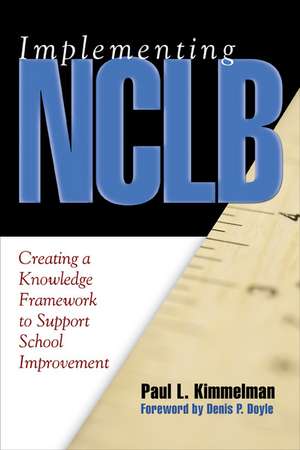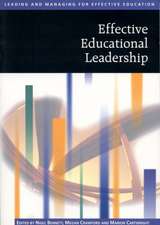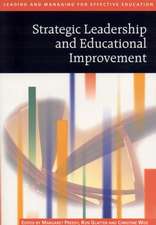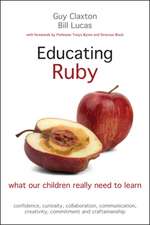Implementing NCLB: Creating a Knowledge Framework to Support School Improvement
Autor Paul L. Kimmelmanen Limba Engleză Paperback – 15 mai 2006
Implementing change is hard work, and Kimmelman includes lessons in leadership from education, science, and business. The book includes examples of current practices, research, strategies and reflective questions, and action ideas to help leaders and leadership teams move these ideas into practice.
| Toate formatele și edițiile | Preț | Express |
|---|---|---|
| Paperback (1) | 277.61 lei 6-8 săpt. | |
| SAGE Publications – 15 mai 2006 | 277.61 lei 6-8 săpt. | |
| Hardback (1) | 438.09 lei 6-8 săpt. | |
| SAGE Publications – 22 mai 2006 | 438.09 lei 6-8 săpt. |
Preț: 277.61 lei
Nou
Puncte Express: 416
Preț estimativ în valută:
53.12€ • 55.10$ • 44.30£
53.12€ • 55.10$ • 44.30£
Carte tipărită la comandă
Livrare economică 27 martie-10 aprilie
Preluare comenzi: 021 569.72.76
Specificații
ISBN-13: 9781412917148
ISBN-10: 141291714X
Pagini: 208
Dimensiuni: 152 x 229 x 11 mm
Greutate: 0.29 kg
Ediția:1
Editura: SAGE Publications
Colecția Corwin
Locul publicării:Thousand Oaks, United States
ISBN-10: 141291714X
Pagini: 208
Dimensiuni: 152 x 229 x 11 mm
Greutate: 0.29 kg
Ediția:1
Editura: SAGE Publications
Colecția Corwin
Locul publicării:Thousand Oaks, United States
Recenzii
"I believe this book should be read by every administrator and teacher leader. It provides a framework for schools to address the need for continuous school improvement in order to meet the expectations of NCLB."
"This inspirational book provides a convincing and compelling call to action. Kimmelman provides plenty of practical examples and moves easily between specific applications and the big picture."
“This is a must-read book for anyone who cares about NCLB. By owning up to the difficulty of implementation—and proffering real ideas for meeting NCLB’s challenges—it provides the armature for essential reform and improvement efforts.”
" . . . an important guide to thinking about how to create the infrastructure to support sustained school improvement. Kimmelman's extensive experience as an educator coupled with his understanding of policymaking and research allow him to transcend the silos that too often constrain thinking about these issues."
"Kimmelman takes a positive view on NCLB, and his writing assumes a 'make no excuses' tone. He believes educators should stop expending time and effort debating NCLB and concentrate their efforts on raising student achievement levels."
"This inspirational book provides a convincing and compelling call to action. Kimmelman provides plenty of practical examples and moves easily between specific applications and the big picture."
“This is a must-read book for anyone who cares about NCLB. By owning up to the difficulty of implementation—and proffering real ideas for meeting NCLB’s challenges—it provides the armature for essential reform and improvement efforts.”
" . . . an important guide to thinking about how to create the infrastructure to support sustained school improvement. Kimmelman's extensive experience as an educator coupled with his understanding of policymaking and research allow him to transcend the silos that too often constrain thinking about these issues."
"Kimmelman takes a positive view on NCLB, and his writing assumes a 'make no excuses' tone. He believes educators should stop expending time and effort debating NCLB and concentrate their efforts on raising student achievement levels."
Cuprins
Foreword by Denis Doyle
Preface
Acknowledgements
About the Author
1. What Education Events Led to NCLB
2. Using Knowledge to Build Organizational Capacity
3. Knowledge Acquisition
4. Knowledge Management
5. Knowledge Implementation
6. Stories of Courageous Leadership
7. Final Words
Resource A: Tibbott Case Study
Resource B: High School Reform
References
Index
Preface
Acknowledgements
About the Author
1. What Education Events Led to NCLB
2. Using Knowledge to Build Organizational Capacity
3. Knowledge Acquisition
4. Knowledge Management
5. Knowledge Implementation
6. Stories of Courageous Leadership
7. Final Words
Resource A: Tibbott Case Study
Resource B: High School Reform
References
Index
Notă biografică
Paul L. Kimmelman is senior adviser to the CEO at Learning Point Associates. He has served as a consultant to the Qualifications and Curriculum Authority in England, and senior consultant to Project 2061 Professional Development Programs of the American Association for the Advancement of Science. He worked in K¿12 education for more than 30 years as a teacher, high school assistant principal, middle school principal, assistant superintendent, and superintendent, and he has been an adjunct professor at several colleges and universities. Currently, he is adjunct professor at Argosy University. As superintendent in Lima, Ohio, he worked to help the district successfully comply with a federal desegregation order. He served as president of the First in the World Consortium when he was a superintendent in Illinois. The consortium was a collaborative group of school districts that were the first noncountry group to participate in the Third International Mathematics and Science Study. He has authored numerous articles and publications on education and presented at national and state education meetings. He is author of Implementing NCLB: Creating a Knowledge Framework to Support School Improvement (2006) and coauthor (with David Kroeze) of Achieving World-Class Schools: Mastering School Improvement Using a Genetic Model (2002). He was appointed by former U.S. Secretary of Education Richard Riley to the National Commission on Mathematics and Science Teaching, chaired by former senator and astronaut John Glenn, and served on the Third International Mathematics and Science Study Technical Review Panel. He was also appointed by U.S. Secretary of Education Rod Paige to serve on the Teacher Assistance Corps and participated in the Teacher-to-Teacher project, offering sessions on building teacher leaders.
Descriere
The author shows readers how to overcome the challenge of implementing NCLB by building organizational capacity through a knowledge model.












